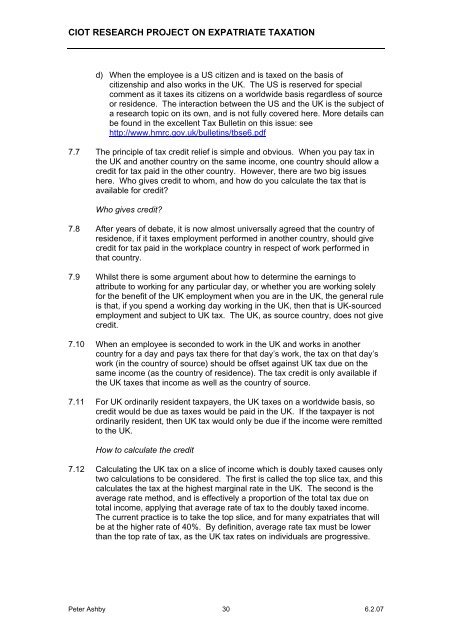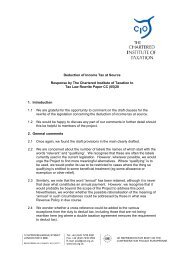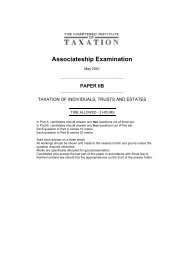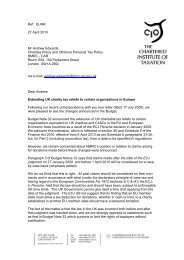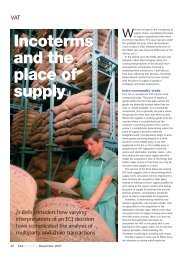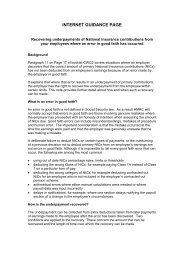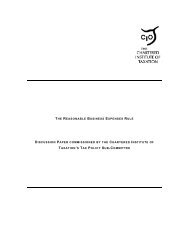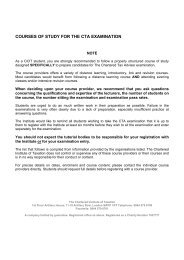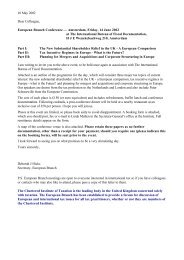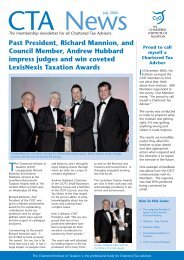Expatriate taxation - CIOT - The Chartered Institute of Taxation
Expatriate taxation - CIOT - The Chartered Institute of Taxation
Expatriate taxation - CIOT - The Chartered Institute of Taxation
You also want an ePaper? Increase the reach of your titles
YUMPU automatically turns print PDFs into web optimized ePapers that Google loves.
<strong>CIOT</strong> RESEARCH PROJECT ON EXPATRIATE TAXATION<br />
d) When the employee is a US citizen and is taxed on the basis <strong>of</strong><br />
citizenship and also works in the UK. <strong>The</strong> US is reserved for special<br />
comment as it taxes its citizens on a worldwide basis regardless <strong>of</strong> source<br />
or residence. <strong>The</strong> interaction between the US and the UK is the subject <strong>of</strong><br />
a research topic on its own, and is not fully covered here. More details can<br />
be found in the excellent Tax Bulletin on this issue: see<br />
http://www.hmrc.gov.uk/bulletins/tbse6.pdf<br />
7.7 <strong>The</strong> principle <strong>of</strong> tax credit relief is simple and obvious. When you pay tax in<br />
the UK and another country on the same income, one country should allow a<br />
credit for tax paid in the other country. However, there are two big issues<br />
here. Who gives credit to whom, and how do you calculate the tax that is<br />
available for credit<br />
Who gives credit<br />
7.8 After years <strong>of</strong> debate, it is now almost universally agreed that the country <strong>of</strong><br />
residence, if it taxes employment performed in another country, should give<br />
credit for tax paid in the workplace country in respect <strong>of</strong> work performed in<br />
that country.<br />
7.9 Whilst there is some argument about how to determine the earnings to<br />
attribute to working for any particular day, or whether you are working solely<br />
for the benefit <strong>of</strong> the UK employment when you are in the UK, the general rule<br />
is that, if you spend a working day working in the UK, then that is UK-sourced<br />
employment and subject to UK tax. <strong>The</strong> UK, as source country, does not give<br />
credit.<br />
7.10 When an employee is seconded to work in the UK and works in another<br />
country for a day and pays tax there for that day’s work, the tax on that day’s<br />
work (in the country <strong>of</strong> source) should be <strong>of</strong>fset against UK tax due on the<br />
same income (as the country <strong>of</strong> residence). <strong>The</strong> tax credit is only available if<br />
the UK taxes that income as well as the country <strong>of</strong> source.<br />
7.11 For UK ordinarily resident taxpayers, the UK taxes on a worldwide basis, so<br />
credit would be due as taxes would be paid in the UK. If the taxpayer is not<br />
ordinarily resident, then UK tax would only be due if the income were remitted<br />
to the UK.<br />
How to calculate the credit<br />
7.12 Calculating the UK tax on a slice <strong>of</strong> income which is doubly taxed causes only<br />
two calculations to be considered. <strong>The</strong> first is called the top slice tax, and this<br />
calculates the tax at the highest marginal rate in the UK. <strong>The</strong> second is the<br />
average rate method, and is effectively a proportion <strong>of</strong> the total tax due on<br />
total income, applying that average rate <strong>of</strong> tax to the doubly taxed income.<br />
<strong>The</strong> current practice is to take the top slice, and for many expatriates that will<br />
be at the higher rate <strong>of</strong> 40%. By definition, average rate tax must be lower<br />
than the top rate <strong>of</strong> tax, as the UK tax rates on individuals are progressive.<br />
Peter Ashby 30 6.2.07


